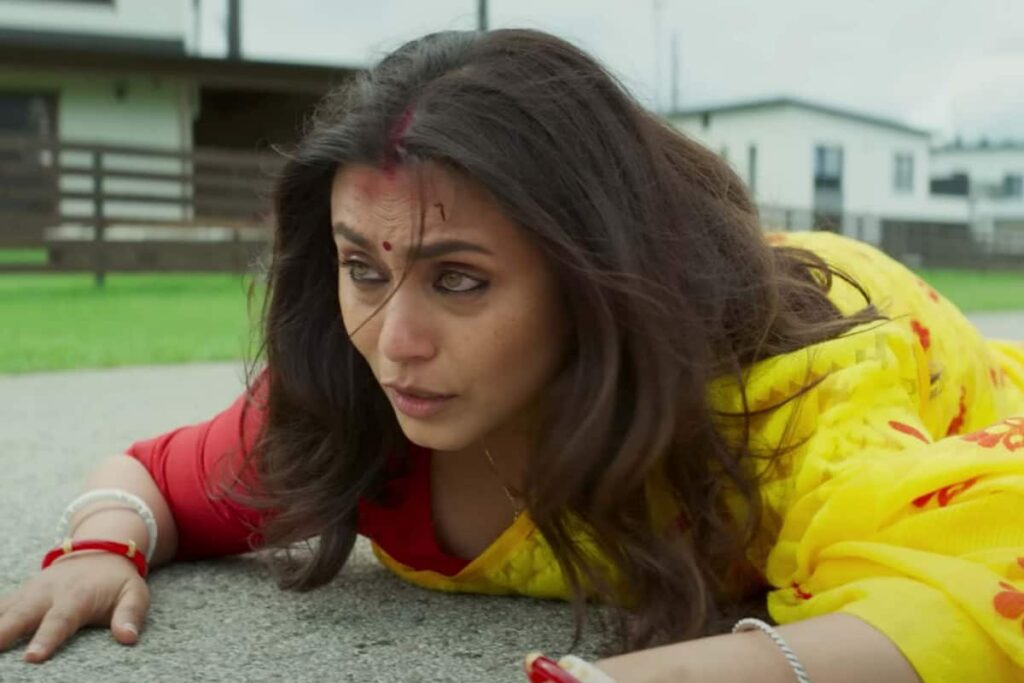Ashima Chibber’s Mrs. Chatterjee VS Norway is based on the real-life, heroic tale of Sagarika Chakraborty, an Indian woman whose children were taken away from her by the Norwegian Child Welfare Services due to her Indian cultural practices that were considered improper by the authorities of Norway. Chakraborty, thereafter, ran from pillar to post, leaving no stone unturned in her quest to reclaim custody of her children. The premise had all the ingredients for an emotionally engaging story but sadly, the the film lacks a strong directorial grasp, which reduces the potent content of the film to an average outing in its better moments at best.
Mrs. Chatterjee VS Norway begins with Debika (Rani Mukerji) and Aniruddha Chatterjee’s (Anirban Bhattacharya) young son, Shubh, and their five-month-old daughter, Shuchi, being deceitfully taken away by the three women who work for Norway’s Child Welfare Service. In a flashback, it is revealed that the Chatterjee family was under the surveillance for the previous ten weeks. Sia (Kärt Tammjärv) and Matilda (Britta Soll), two young Norwegian women from the Child Welfare Services, were tasked with reporting to the authorities whether the Chaterjees are capable of providing proper care and attention to their children. But, as fate would have it, Debika and Aniruddha lose custody of their two children. A long legal battle ensues that lasts for months but does not yield any fruitful result for the suffering parents. Debika’s frustration with the legal procedures of the country and the discovery of a bitter truth compels her to finally take the law into her own hands. She steals her children from the care of their foster parents and decides to cross borders into Sweden. But her courageous act only lands her in more trouble. Meanwhile, the tension between Debika and Aniruddha is tellinging on their marriage. When Indian External Affairs Minister, Vasudha Kamat (Neena Gupta), visits Norway for finalizing a telecom deal, Debika utilizes the situation for her benefit…
The strength of the narrative in any melodramatic film that puts ordinary humans into extraordinary situations depends on how the scenes are cemented together to effectively bring out the emotional potential of the story. Mrs. Chatterjee VS Norway fails here due to the weak writing by its trio of screenwriters – Chibber, Sameer Satija, and Rahul Handa. The dramatic events in the film occur at such a hurried pace that we as viewers are simply unable to process them in order to empathize with the trauma and pain that the principal characters undergo. Right from the beginning, where Debika anchors herself to the moving car, to her mandatory monologue at the end of the film, the film is so rushed that we gasp for breathing space instead of engaging with the story. The scene before the intermission, for instance, where she tries to sneak into Sweden with her two children, had a lot of potential to keep us on the edge of our seats. But again, this scene is executed so speedily that it fails to impact us. The courtroom scenes in Norway end up being equally ineffective and lose steam, thereby making the film a tedious watch.
Performance-wise, Rani Mukerji as Debika labors to bring some emotional intensity to her character but she is badly defeated by the writing as Debika is largely featured as little more than a poor victim of the cruel system in order to earn our empathy. She is mostly teary-eyed or helpless right through the film. Logically, it also appears odd that though she has been living in Norway for a good length of time, she is totally unfamiliar with the rules and regulations of the country. Anirban Bhattacharya, as the self-centred and conniving husband of Debika delivers an effective performance that makes us abhor his character as we should. Jim Sarbh as the Norwegian lawyer, Daniel Singh Ciupek, gives a touch of sophistication to his characters, never appearing to be melodramatic as some of the other characters. But Anirban’s mother and Debika’s mother-in-law’s (Mithu Chakraborty) hostile attitude toward Debika is done with such triteness that their exchanges seem to be picked up from from the worst of Indian daily soaps. And the two women from the welfare service, Sia and Matilda, are depicted as villainous, cardboard caricatures to drive home the impression that white people are always vicious.
A saving grace in the film is Alvar Kõue’s cinematography, which lifts the storytelling with the framing and lighting to create some emotional connect with the film. The way he composes Debika within the vast office spaces of the government buildings makes her look and feel small in a world where she has to face many challenges. Namrata Rao’s editing tries to bring some rhythm to the film’s narrative but the hastily directed scenes don’t help her cause. Amit Trivedi’s song serve efficiently as a medium to show the happier times of bygone days for the Chatterjee family and also the passage of time. However, the soundscape of the film is dominated by the background score by Hitesh Sonik, which overpowers our emotions.
In the end, there isn’t much to Mrs. Chatterjee VS Norway. Since the film can’t get past its overly melodramatic mentality, it only manages to be interesting in some portions here and there. Thus, even when it runs, it never ever gathers the momentum at any point to truly take-off.
Hindi, Drama, Color


